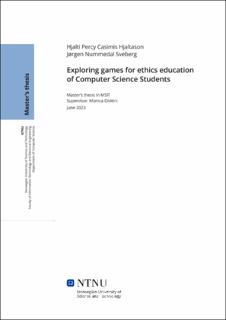| dc.contributor.advisor | Divitini, Monica | |
| dc.contributor.author | Hjaltason, Hjalti Percy Casimis | |
| dc.contributor.author | Sveberg, Jørgen Nummedal | |
| dc.date.accessioned | 2023-10-18T17:20:29Z | |
| dc.date.available | 2023-10-18T17:20:29Z | |
| dc.date.issued | 2023 | |
| dc.identifier | no.ntnu:inspera:145904930:34496968 | |
| dc.identifier.uri | https://hdl.handle.net/11250/3097371 | |
| dc.description.abstract | Nylige utviklinger innen datavitenskap har forårsaket uro angående etikken rundt utvikling og bruk av disse teknologiene. Teknologier som fortsatt er under stor endring, slik som den nye bølgen av kunstig intelligens-baserte redskaper, har skapt diskusjoner i media rundt rollen til etisk utdanning for utviklere som ønsker å skape slike redskaper. Organisasjoner slik som Norges Ingeniør- og Teknologorganisasjon (NITO), har uttrykt at de mener det er stor trang for å implementere etikkutdanning i utdanningsplanen for fremtidige utviklere (Vaaland 2022a). NITO har også uttrykt at denne utdanning burde involvere at studenten får praktisk erfaring med å håndtere etiske dilemma.
Denne oppgaven vil utforske hvordan utdanning innen etikk i feltet datavitenskap kan bli supplementert ved bruk av spill skapt spesifikt for å fasilitere interaksjon med forskjellige etiske scenarier. Spill var valgt som et passende redskap på grunn av dets natur som et interaktivt medium, som lar spillere simulere å gjøre beslutninger og se konsekvensene av dem.
Arbeidet startet med en litteraturgjennomgang som var utført for å få et helhetlig syn på hvordan spill har blitt utviklet for å supplere etikkutdanning. De resulterende dokumentene var brukt for å utvikle to spill-konsepter, som var modifisert og utviklet gjennom en iterativ designprosess, bestående av tre iterasjoner. Den første iterasjonen var oppbygget av intervjuer med tre relevante eksperter innen datavitenskap, etikk og spill. Den andre iterasjonen var oppbygget av intervjuer med datavitenskap studenter. Den tredje iterasjonen var oppbygget av et intervju som inkluderte en full gjennomspilling av begge prototypene.
Resultatene av forskningen utført i denne oppgaven består av designet og prototypene av to spill og evalueringen av dem. Det første spillet er et papirbasert kompetitivt kortspill kalt Startup-Superfight, og det andre er et narrativ-drevet diskusjon spill kalt Consultant Tycoon.
Den siste iterasjonen av spill-konseptene og deres assosierte prototyper mottok hovedsakelig positiv tilbakemelding. Derimot var det observert en forskjell i hvordan samtalene mellom spillerne tok plass under gjennomspillingen. Disse forskjellene er tenkt å komme fra designet av prototypene selv, og til dels fra hvordan de kompetitive og kooperative aspektene av spillene kan påvirke samtalene. Spillkonsept og prototype evalueringene presentert i denne oppgaven kan fungere som inspirasjon for fremtidig utvikling av seriøse spill for etikk utdanning for datavitenskap studenter. | |
| dc.description.abstract | Recent developments in the field of computer science have caused concerns regarding the ethics of the development, application and use of these technologies. Technologies that are still emerging, such as the new wave of Artificial intelligence based tools, have caused discussions in the media regarding the role of ethics education for developers aspiring to create these tools. Organisations, such as the Norwegian Society of Engineers and Technologists (NITO), have expressed that there is a need to implement ethics education within the educational programmes of future programmers (Vaaland 2022a). NITO has also expressed that this education should involve the student getting to practice on handling ethical dilemmas.
This thesis explores how education within ethics in the field of computer science could be supplemented by using games made specifically to facilitate interaction with various ethical scenarios. Games were thought to be a fitting tool due to their nature as an interactive medium, allowing players to simulate making decisions and seeing the consequences of them.
The work started with a literature review that was performed to get a comprehensive view of how games have been developed to supplement ethics education. The resulting documents were used to develop two game concepts, which were modified and developed through an iterative design process, consisting of three iterations. The first iteration consisting of interviews with three relevant experts within computer science, ethics and games. The second iteration consisting of interviews with computer science students. The third iteration consisting of an interview that included a full play session of two prototypes.
The results of the research performed in this thesis consists of the design and prototypes of two games and the evaluation of them. The first game is a card-based competitive game called Startup-superfight and the second is a narrative-driven discussion game called Consultant Tycoon.
The last iteration of the game concepts and their associated prototypes received mostly positive feedback. However, there was observed a difference in how the conversations between students take shape when playing the prototypes. These differences are thought to partly come from the design of the prototypes themselves, and partially from the ways collaborative and competitive aspects of the games could affect conversations. The game concepts and prototype evaluations presented in this thesis could serve as inspiration for the future development of serious games for ethics education of computer science students. | |
| dc.language | eng | |
| dc.publisher | NTNU | |
| dc.title | Exploring games for ethics education of Computer Science Students | |
| dc.type | Master thesis | |
